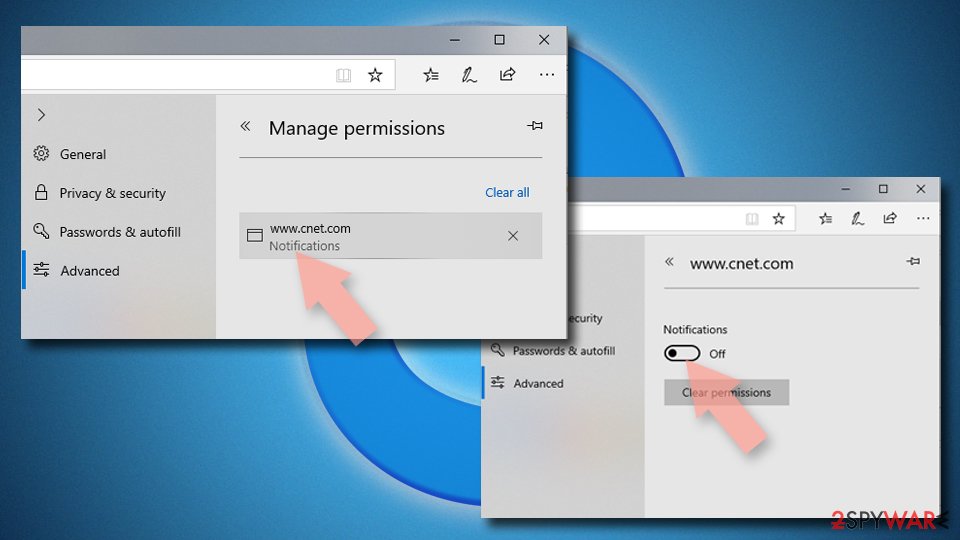Xxx-offers.com ads (Free Guide)
Xxx-offers.com ads Removal Guide
What is Xxx-offers.com ads?
Xxx-offers.com ads might lead users to malicious websites and infect them with malware

Xxx-offers.com is a website engineered by scammers to trick users into subscribing to push notifications, which can later be used to deliver all sorts of malicious advertisements directly to users' desktops. Most people don't even remember the site's name until they start seeing intrusive pop-ups that would cover every other application window on the screen. Usually, they appear on the screen's top-right or bottom-right corner, depending on the operating system.
The operation of Xxx-offers.com push notifications is only possible if the browser is running, and it doesn't even need to be actively used. For example, users may be visiting unrelated websites or watching a video while having the browser opened in the background, and they may still receive the ads. The worst part is that the advertisements coming from the site would also be malicious, they would be exposed to various fake virus alerts, get-rich-quick scams, and similar phishing material.
Do not click any links within these push notifications, or you may end up installing potentially dangerous software on your system, providing your sensitive information to cybercriminals, or losing money to various scams. If you have been struggling with removing suspicious pop-ups, please check out the details below – we explain how to tackle push notifications and ensure the system is not infected.
| Name | Xxx-offers.com |
| Type | Push notifications, ads, pop-ups, scam |
| Distribution | The website can start to show ads at any point after the “Allow” button within the notification prompt is clicked on the site |
| Symptoms | Push notifications show on the desktop at random time intervals. These pop-ups show fake notices and push scams. Links can also lead to malware-laden sites |
| Dangers | You might suffer from monetary losses, install malware or potentially unwanted programs, or disclose sensitive data to cybercriminals |
| Removal | Access browser settings to stop intrusive push notifications. After that, make sure that your system is not infected with adware or malware – scan it with SpyHunter 5Combo Cleaner |
| Other tips | FortectIntego can help you when dealing with leftover adware files, for example, you can get rid of various browser trackers and fix system damage automatically |
How users end up on malicious sites
In order for Xxx-offers.com to be successful, users first have to enter the scam site, and it is not surprising that they wouldn't do that on purpose. There are only two main ways how users might end up on this site – they can be redirected after clicking a malicious link or being forced there by adware[1] installed on their systems.
When using reliable search engines such as Google or Yahoo, users are unlikely to be served with links that would lead them to dangerous sites. In fact, tech giants use special filters and scanners to prevent that from happening as much as possible. However, when visiting websites of dubious nature (X-rated, software crack downloads, etc.), the scanners from Google are simply absent, so there is little to no moderation in these sites.
As a result, people are fooled into clicking on fake “Download” buttons or similar misleading links that would direct them to sites like Xxx-offers.com. In some cases, they don't even need to click anything due to malicious scripts embedded in these sites. Thus, redirects come as a surprise to many, which works in favor of a phishing[2] site.
In other cases, adware could also play a major role in these situations, as it is strongly associated with unwanted browser behavior. To check your system thoroughly and ensure it is not infected with adware or other potentially unwanted or malicious software, we recommend scanning it with SpyHunter 5Combo Cleaner or Malwarebytes security software, which can also serve as a defense against future attacks. FortectIntego can be used to fix virus damage and clean browsers from trackers such as cookies[3] for better privacy.
The tricks of online fraud
Users would never knowingly sign up for push notifications from unsafe websites. Because of this, scammers create phishing messages that attempt to deceive users. The following message is one of the most commonly used ones on these types of websites and can also be seen on Cartech.cfd, Cms100.xyz, Mscoldness.com, and many others:
Click Allow if you are not a robot
Although the phrasing and backing image of the robot may be slightly different, the basic idea is always the same: users are asked to confirm that they are human. It's easy to understand how individuals can mistake these two on the Xxx-offers.com scam page because this check is one of the most frequent occurrences people have when surfing (selecting the right photos or avoiding captcha phrases is fairly common practice).

Users may experience other requests in addition to this one since the image and the content included inside it are dynamic. They can be informed, for instance, that their browsers are blocking a video from playing, that they have won a pricey prize, or that they must verify their age. Remember that the push notification prompt has only one purpose, despite what the background message and image suggest; all these techniques are frequently used by push notification scam websites and should be promptly identified.
Stop ads from suspicious websites
It is dangerous to continue receiving push notifications from websites like Xxx-offers.com. Not only can it be frustrating and intrusive, but it may also result in links being clicked by accident, leading to dangerous sites. Should you be redirected by these links, please make sure you never interact with any of the site contents and close down the tab immediately.
To stop the intrusive activity, you would have to access browser settings and block the related URL from displaying push notifications. Proceed with the following guide for your browser:
Google Chrome
- Open the Google Chrome browser and go to Menu > Settings.
- Scroll down and click on Advanced.
- Locate the Privacy and security section and pick Site Settings > Notifications.
- Look at the Allow section and look for a suspicious URL.
- Click the three vertical dots next to it and pick Block. This should remove unwanted notifications from Google Chrome.
![Stop notifications on Chrome PC 2 Stop notifications on Chrome PC 2]()
Google Chrome (Android)
- Open Google Chrome and tap on Settings (three vertical dots).
- Select Notifications.
- Scroll down to the Sites section.
- Locate the unwanted URL and toggle the button to the left (Off position).
![Stop notifications on Chrome Android Stop notifications on Chrome Android]()
Mozilla Firefox
- Open Mozilla Firefox and go to Menu > Options.
- Click on Privacy & Security section.
- Under Permissions, you should be able to see Notifications. Click the Settings button next to it.
- In the Settings – Notification Permissions window, click on the drop-down menu by the URL in question.
- Select Block and then click on Save Changes. This should remove unwanted notifications from Mozilla Firefox.
![Stop notifications on Mozilla Firefox 2 Stop notifications on Mozilla Firefox 2]()
Safari
- Click on Safari > Preferences…
- Go to the Websites tab and, under General, select Notifications.
- Select the web address in question, click the drop-down menu and select Deny.
![Stop notifications on Safari Stop notifications on Safari]()
MS Edge
- Open Microsoft Edge, and click the Settings and more button (three horizontal dots) at the top-right of the window.
- Select Settings and then go to Advanced.
- Under Website permissions, pick Manage permissions and select the URL in question.
- Toggle the switch to the left to turn notifications off on Microsoft Edge.
![Stop notifications on Edge 2 Stop notifications on Edge 2]()
MS Edge (Chromium)
- Open Microsoft Edge, and go to Settings.
- Select Site permissions.
- Go to Notifications on the right.
- Under Allow, you will find the unwanted entry.
- Click on More actions and select Block.
![Stop notifications on Edge Chromium Stop notifications on Edge Chromium]()
Internet Explorer
- Open Internet Explorer, and click on the Gear icon at the top-right of the window.
- Select Internet options and go to the Privacy tab.
- In the Pop-up Blocker section, click on Settings.
![Stop notifications on Internet Explorer Stop notifications on Internet Explorer]()
- Locate the web address in question under Allowed sites and pick Remove.
How to prevent from getting adware
Choose a proper web browser and improve your safety with a VPN tool
Online spying has got momentum in recent years and people are getting more and more interested in how to protect their privacy online. One of the basic means to add a layer of security – choose the most private and secure web browser. Although web browsers can't grant full privacy protection and security, some of them are much better at sandboxing, HTTPS upgrading, active content blocking, tracking blocking, phishing protection, and similar privacy-oriented features. However, if you want true anonymity, we suggest you employ a powerful Private Internet Access VPN – it can encrypt all the traffic that comes and goes out of your computer, preventing tracking completely.
Lost your files? Use data recovery software
While some files located on any computer are replaceable or useless, others can be extremely valuable. Family photos, work documents, school projects – these are types of files that we don't want to lose. Unfortunately, there are many ways how unexpected data loss can occur: power cuts, Blue Screen of Death errors, hardware failures, crypto-malware attack, or even accidental deletion.
To ensure that all the files remain intact, you should prepare regular data backups. You can choose cloud-based or physical copies you could restore from later in case of a disaster. If your backups were lost as well or you never bothered to prepare any, Data Recovery Pro can be your only hope to retrieve your invaluable files.
- ^ Adware. Investopedia. Source of financial content on the web.
- ^ Phishing attacks. Imperva. Application and data security.
- ^ Cookies and Web Beacons. NTT. NTT Communications.







